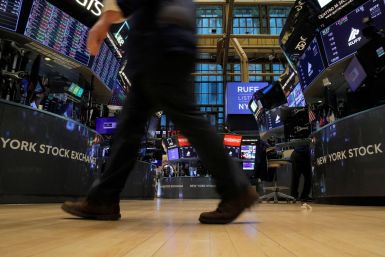U.S. stock futures and European stocks fell into the red on Monday, with markets remaining nervous that Russia could invade Ukraine despite attempts to defuse the crisis.
Oil prices fell on Monday, reversing course from strong initial gains, as news of fresh diplomatic efforts to resolve the Ukraine crisis provided some relief from concerns about crude supply.
Oil prices gained more than $1 in early trade on Monday on rising jitters over potential conflict between Russia and Ukraine, with the United States and European Union making clear Russia would face sanctions if it invaded its neighbour.
Oil prices rose on Monday as fresh diplomatic efforts to resolve the Ukraine crisis provided some relief from supply concerns that have kept oil prices near $100 a barrel.
Oil prices rose on Monday over the stand-off between Russia and the West over Ukraine, adding to supply concerns that have kept oil prices near $100 a barrel.
Oil prices fell on Monday on a plan for U.S. President Joe Biden and Russia's Vladimir Putin to hold a summit on the Ukraine crisis and on prospects of a nuclear deal between Iran and world powers in the next week or two.
Oil prices rose on Monday as tensions between Russia and the West ratcheted up, adding to supply concerns that have kept oil prices near $100 a barrel.
A potential invasion of Ukraine by neighbouring Russia would be felt across a number of markets, from wheat and energy prices and the region's sovereign dollar bonds to safe-haven assets and stock markets.
A U.S. stock market, already on edge from a hawkish Federal Reserve and a conflict between Russia and Ukraine, now has another worry: higher oil prices.
After a turbulent start to the year, investors are betting stock market volatility isn't going away anytime soon.
After a turbulent start to the year, investors are betting stock market volatility isn't going away anytime soon.
Eurodollar futures, which reflect the outlook for U.S.
Germany and the United States clashed on Friday over whether nuclear power should be part of the energy mix as rich countries race to cut emissions to limit the impact of global warming.
South African miner Exxaro and Chinese state fund CNIC are among potential buyers admitted to the final round of bidding for African renewable energy firm Lekela Power - a company worth around $2 billion, a number of sources familiar with the deal told Reuters.
When the Federal Reserve tacked to a new brand of monetary policy 18 months ago it thought it could deliver low unemployment and tame inflation.
U.S. home sales unexpectedly increased in January, but investors paying in cash are squeezing out first-time buyers from the housing market amid record low inventory and higher prices.
India and the United Arab Emirates signed a broad trade and investment pact on Friday that will eventually cut all tariffs on each other's goods and aims to increase annual trade between the two nations to $100 billion within five years.
Argentina's deal with the International Monetary Fund (IMF) to refinance over $40 billion in debts is trudging closer to the finish line, despite protests in the South American country that has a long and uneasy history with the global lender.
The Canadian dollar was little changed against its U.S.
European companies hoping to fund M&A and capital expenditures on bond markets this year are facing a sudden jump in borrowing costs and wary buyers after the ECB's shock pivot towards tighter monetary policy.
European companies hoping to fund M&A and capital expenditures on bond markets this year are facing a sudden jump in borrowing costs and wary buyers after the ECB's shock pivot towards tighter monetary policy.
The European Union is considering making more information available on trading in its carbon market, according to a draft document, amid calls from some governments to limit financial speculators' participation in the scheme.
A global supply crunch of electrolysers needed to produce green hydrogen and a lack of domestic manufacturers to make them pose a major challenge to India's ambitious targets to use the zero-carbon fuel, a government official told Reuters.
U.S. stock indexes slumped on Friday as escalating tensions in Ukraine amid fears of an imminent Russian invasion prompted investors to dump risky assets in the run-up to a long weekend.
U.S. stocks struggled for direction on Friday, as investors kept a wary eye on building tensions in Ukraine heading into a long weekend.
U.S. stock indexes were set to rise on Friday as news of talks between the United States and Russia over tensions in Ukraine calmed investor nerves.
Uganda on Friday blamed its withdrawal from an International Coffee Organisation (ICO) agreement this month on what it said are unfair tariffs and other barriers that restrict export of processed coffee to Europe and elsewhere.
OPEC+ will work to integrate Iran into its oil supply-limiting accord should agreement be reached on reviving its nuclear deal with world powers, sources close to the group said, seeking to avoid market share competition that could hit prices.
UK-based maritime company Fleetscape is investigating the possible transfer of Iranian oil to a tanker it finances, the Oaktree Capital Management-backed firm said after allegations by a U.S.
The European Union wants to require countries to fill natural gas storage ahead of each winter, to help bolster stocks and cope with supply disruptions, according to a draft document seen by Reuters.






































